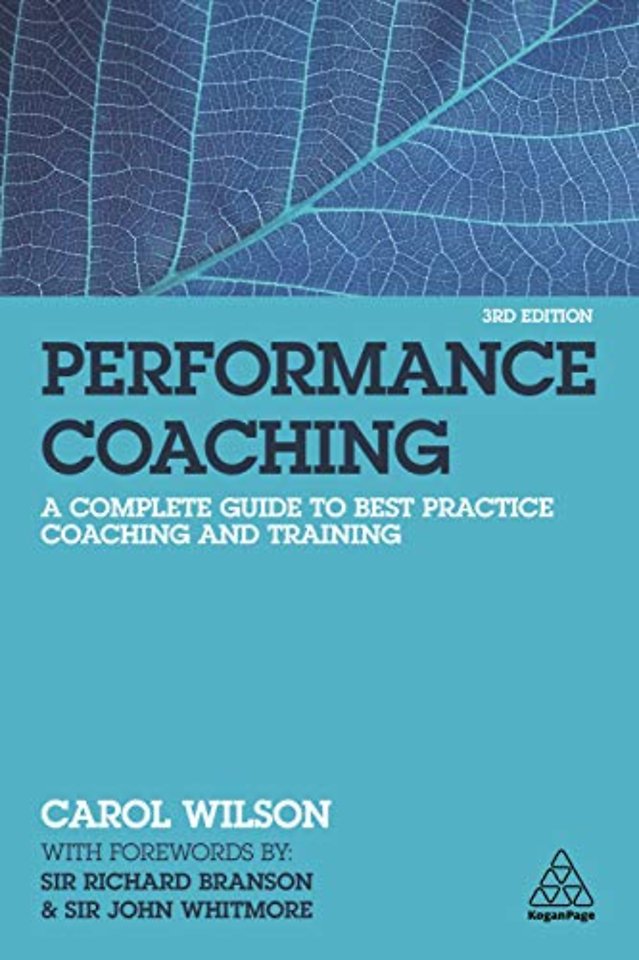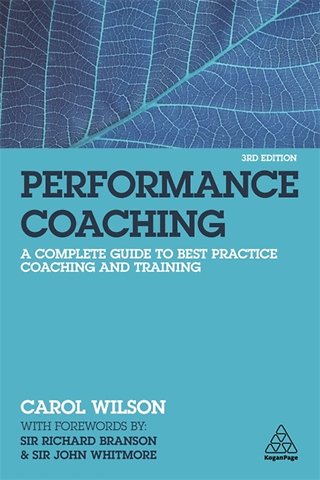Performance Coaching
A Complete Guide to Best Practice Coaching and Training
Paperback Engels 2020 3e druk 9781789664461Samenvatting
Performance Coaching is a complete resource for improving organizational and employee performance through coaching. Full of tips, tools and checklists, it covers all the fundamental elements of the coaching process, from developing the skills needed to coach effectively, to coaching in leadership, manager-as-coach training, cross-cultural coaching and measuring return on investment. It explores the key techniques and models in the field to allow readers to identify which approach is most suited to specific situations.
Featuring case studies from organizations including Virgin, IKEA, the NHS and England Rugby showing how effective coaching approaches have been applied in practice, this book is for coaches of all levels of experience, as well as HR managers and leaders looking to embed a coaching culture in their organizations. This revised third edition of Performance Coaching has been updated to include the latest insights and developments and contains new chapters on creating a global coaching culture, the coaching-mentoring-managing continuum and how to lead a generative thinking meeting. New material also covers distance coach training, neuroscience in coaching, coaching the bully at work and coaching in education.
Specificaties
Lezersrecensies
Inhoudsopgave
Chapter - 01: What is coaching?;
Chapter - 02: The differences between coaching, therapy, counselling, mentoring and consultancy;
Chapter - 03: The directive–non-directive continuum;
Chapter - 04: Self-limiting beliefs;
Chapter - 05: Coaching and neuroscience;
Section - TWO: Creating a coaching culture in organizations;
Chapter - 06: The meaning of a coaching culture;
Chapter - 07: Ten steps to creating a coaching culture;
Chapter - 08: Coaching in the workplace;
Chapter - 09: Coach training in the workplace;
Chapter - 10: Coaching in leadership;
Chapter - 11: Cross-cultural coaching;
Chapter - 12: Distance coach training;
Chapter - 13: Coaching in schools;
Chapter - 14: Coaching for Crisis at Christmas;
Chapter - 15: Corporate social responsibility and shared value - bringing business and society back together;
Chapter - 16: Bullying in the workplace;
Chapter - 17: Resilience in leadership;
Chapter - 18: Coaching supervision: a workplace perspective;
Chapter - 19: ROI - Measuring the return on investment in coaching;
Section - THREE: Skills for coaches and managers;
Chapter - 20: Listening;
Chapter - 21: Reflecting, summarizing and clarifying;
Chapter - 22: Questioning;
Chapter - 23: Permission protocol;
Chapter - 24: The GROW coaching model;
Chapter - 25: The EXACT model - a coaching approach to goal setting;
Chapter - 26: Coaching feedback;
Chapter - 27: The structure of coaching;
Chapter - 28: Setting and reviewing actions;
Section - FOUR: Tools of the trade - continuing professional development;
Chapter - 29: David Grove’s Clean Language;
Chapter - 30: David Grove’s Emergent Knowledge;
Chapter - 31: Transpersonal coaching;
Chapter - 32: An introduction to neuro-linguistic programming;
Chapter - 33: Systemic Coaching;
Chapter - 34: Transactional analysis and the OK Corral;
Chapter - 35: 360-degree feedback;
Chapter - 36: The Reuven Bar-On Emotional Quotient inventory (BarOn EQ-i);
Chapter - 37: Thomas-Kilmann Conflict Mode Instrument;
Chapter - 38: Marshall Rosenberg’s ‘Non-Violent Communication’;
Chapter - 39: Peer leadership
Chapter - 40: Situational Leadership;
Chapter - 41: Kouzes and Posner: The Leadership Challenge;
Chapter - 42: Cultural Transformation Tools;
Chapter - 43: The Inner Game;
Chapter - 44: Nancy Kline’s Thinking Environment;
Chapter - 45: Appreciative Inquiry;
Chapter - 46: Mindfulness;
Chapter - 47: Elizabeth Kubler Ross’s Change Curve six stage model;
Chapter - 48: Bruce Tuckman’s ‘forming, storming, norming and performing’ team development model;
Chapter - 49: The Myers-Briggs Type Indicator (MBTI®);
Chapter - 50: The Enneagram;
Chapter - 51: Kolb’s learning styles;
Chapter - 52: DISC;
Chapter - 53: Johari Window;
Chapter - 54: More team role models
Anderen die dit boek kochten, kochten ook
Rubrieken
- advisering
- algemeen management
- coaching en trainen
- communicatie en media
- economie
- financieel management
- inkoop en logistiek
- internet en social media
- it-management / ict
- juridisch
- leiderschap
- marketing
- mens en maatschappij
- non-profit
- ondernemen
- organisatiekunde
- personal finance
- personeelsmanagement
- persoonlijke effectiviteit
- projectmanagement
- psychologie
- reclame en verkoop
- strategisch management
- verandermanagement
- werk en loopbaan







